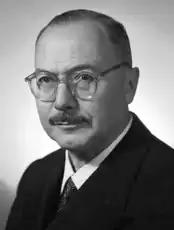Antonio Azara
Antonio Azara (1883–1967) was an Italian jurist and politician who served as the minister of grace and justice from August 1953 to January 1954.
Antonio Azara | |
|---|---|
 | |
| Minister for Grace and Justice | |
| In office August 1953 – January 1954 | |
| Prime Minister | Giuseppe Pella |
| Preceded by | Guido Gonella |
| Succeeded by | Michele De Pietro |
| Personal details | |
| Born | 18 January 1883 Tempio Pausania, Kingdom of Italy |
| Died | 20 February 1967 (aged 84) Rome, Italy |
| Political party |
|
Early life and education
Azara was born in Tempio Pausania on 18 January 1883.[1] He received a bachelor's degree in law specializing on family and agricultural law.[1]
Career
In 1907 Azara became attorney general and first president of the Supreme Court.[2] He was also the secretary of the code reform commission.[1] In 1932 he joined the National Fascist Party.[3] Before his formal party membership he had been supporting National Fascist movement, ideas and doctrines through his writings and activities.[3] As of 1945 he was a member of the scientific committee of the magazine entitled Diritto razzista (Italian: Racist Law).[3] Following the end of the Fascist rule in Italy he justified his activities arguing that he had served not "a party", but his "country".[3]
In 1948 he was elected senator with the Christian Democracy, keeping a seat from Palazzo Madama until 1968.[2] In 1952 he was also appointed public prosecutor of the Supreme Court.[3] He served as the minister of grace and justice in the Pella cabinet from August 1953 to January 1954.[2] He also served as the vice-president of the committee on legal and administrative questions under the Council of Europe.[4]
References
- "Antonio Azara" (in Italian). Paradisola. Retrieved 14 January 2022.
- "Azara, Antonio" (in Italian). Italian Senate. Retrieved 14 January 2022.
- Antonella Meniconi (2020). "The words of Justice and the long Italian transition (1943-1958". In Massimo Meccarelli; Cristiano Paixão; Claudia Roesler (eds.). Innovation and Transition in Law: Experiences and Theoretical Settings. Madrid: Carlos III University of Madrid. p. 169. hdl:10016/31394. ISBN 978 84-1377-163-2.
- Mikael Rask Madsen (Winter 2007). "From Cold War Instrument to Supreme European Court: The European Court of Human Rights at the Crossroads of International and National Law and Politics". Law and Social Inquiry. 32 (1): 141. doi:10.1111/j.1747-4469.2007.00053.x.
External links
 Media related to Antonio Azara at Wikimedia Commons
Media related to Antonio Azara at Wikimedia Commons